Houston Rockets
With Lin and Asik still in Houston, Parsons may find his payday delayed
With the Rockets unable to move Omer Asik and Jeremy Lin, Chandler Parsons seems unlikely to get his new contract until 2015.
Published
11 years agoon
By
Ben DuBose
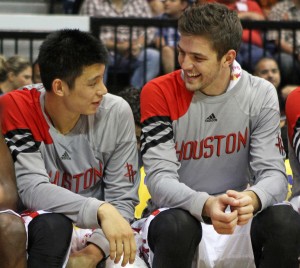
The presence of Jeremy Lin and Omer Asik on the Houston payroll could impact the timing of Chandler Parsons’ eventual contract extension with the Rockets.
Five months ago, I touted the merits of giving Chandler Parsons a long-term contract in July 2014. He’s certainly made his case for it on the floor this year, with his points, field-goal percentage, 3-point percentage, free-throw percentage, rebounds, assists and overall efficiency (PER) all rising relative to last season.
But with the trade deadline passing without a major move, it’s time to contradict myself and explain why that scenario no longer makes sense for the Rockets, who now seem likely to delay Parsons’ extension until July 2015.
With Parsons playing at a low annual salary of just over $900,000, the Rockets have room for three max or near-max salaries around him. Right now, those slots are for James Harden, Dwight Howard and a combination of Omer Asik and Jeremy Lin, who between them take up $16.7 million per year in cap space.
The first two slots, of course, are ideal. But in a league that values quality over quantity, general manager Daryl Morey and the Rockets would prefer to use that remaining $16.7 million on a third “star” player, rather than divided up between two good players. Morey recently expressed his belief that the Rockets “don’t have our third-best player on a championship team yet”.
When I wrote my initial Parsons story in September, the top bullet point was “the Rockets should acquire more key players before mid-2015”. Suddenly, that no longer appears likely. Morey tried desperately to move Asik in December, but couldn’t find an acceptable deal. Respected NBA reporters including Marc Spears and Zach Lowe reported last week that the Rockets also tried to move Lin before the February 20 trade deadline, ultimately to no avail.
Will both Asik and Lin play out their contracts in Houston, which expire after the 2015 season? It remains to be seen. But after the recent failed attempts at trading each, one thing appears clear: a package involving one or both of those players does not carry enough value on the NBA marketplace to net a third “star” in return. Without that, the Rockets appear best suited to hold off on any long-term commitments for the time being – including with Parsons.
The two contract scenarios
David Weiner has done a great job breaking down the math for us. Here’s a quick rundown. The 2014 scenario, which means declining the option for 2014-15 and allowing Parsons to hit restricted free agency this summer, would give the Rockets the right to match any outside offers and likely result in a more team-friendly deal.
Meanwhile, the 2015 route would give Houston one more season of cheap labor ($964,750) from Parsons along with a miniscule July 2015 cap hold of approximately $1.8 million. The downside to this scenario, of course, is that Parsons would be an unrestricted free agent, and other teams would be more likely to offer a higher overall dollar amount.
For his part, Morey played it coy when asked in a recent Q&A with season-ticket holders.
“With Chandler, we have an interesting decision,” said Morey. “At the end of this year, we can turn down his option. People wonder why, because it’s so cheap, but then he’d be a restricted free agent. Or he can go through his fourth year and be an unrestricted free agent. There are advantages to each, so it’s something we’ll continue to talk about.
“He’s going to make a lot of money on his next contract,” Morey added. “We don’t know how much. But we’re committed to keeping him.”
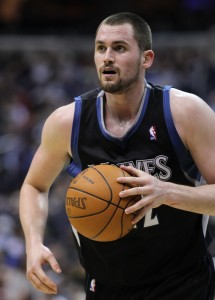
Kevin Love is probably the most attractive option for the Rockets in the July 2015 free agency scenario.
Star search
We’ve long heard that 2015 free agency is important to the Rockets, with a class headlined by Kevin Love and LaMarcus Aldridge — two power forwards with range and potential dream fits. To put it simply, if Parsons is extended this summer, signing a top free agent in 2015 is no longer an option.
The Rockets already have over $38 million in guaranteed 2015-16 salaries, just between Harden and Howard. Add in a base salary of around $9 million for Parsons and minimum cap holds ($500K each) for the remainder of the roster, and the Rockets would already have over $50 million in committed salary. To put it in perspective, the salary cap is at $58.6 million this season. Even if Asik and Lin are allowed to expire, there would not be room to make a major 2015 free agent signing if Parsons has already been extended.
To be fair, there are two ways in which the Rockets could extend Parsons this summer and eventually still acquire a third star. But upon exploring both options, it’s clear that both are unlikely.
Route 1 is 2014 free agency. The Rockets aren’t currently projected to have cap space this summer, when free agents could include LeBron James, Carmelo Anthony and Chris Bosh. But it doesn’t mean Morey won’t try. If Asik and Lin were traded to a team with cap space in June or July of this year, the Rockets could come close to affording a top 2014 free agent while simultaneously pushing Parsons into restricted free agency and locking him up long-term at a cheaper rate.
That said, this plan seems improbable for two reasons. First and foremost is the “balloon payment” issue. Despite the fact that Lin and Asik would each take up just $8.3 million/year in cap space, they are due $15 million/year in 2014-15 in real dollars, all owing to the contract structure Morey used to pry them away from the Knicks and Bulls as restricted free agents in 2012. Reports earlier this season said the high 2014-15 price tags were a stumbling block for rival owners in potential deals, even when offset by smaller current salaries ($5.2 million). As such, it would seem even less likely to find homes for Lin and Asik when they lack a “cheap year” to offset the balloon payment year.
It’s worth noting that the circumstances wouldn’t be identical to Morey’s trade proposals during the season, in which the Rockets likely asked for at least some rotation value in return. After all, the team as currently constructed is a legitimate championship contender, and losing Asik and Lin for nothing but future cap space would’ve been a crippling short-term blow. Morey would seem more likely to make a “cap space” deal in the summer, when he could more immediately reap the benefits.
The problem, however, is that the timing of such a move may not make sense for the other team. If a team theoretically has the cap space for Asik or Lin, they would also likely have room to go after the LeBron/Carmelo/Bosh tier. So why would they use cap space on Asik and/or Lin before even trying for bigger fish? And if they wait until after, the value of a “cap space” trade goes away for the Rockets, since the big free agents would be off the board. It’s not impossible, as evidenced by Golden State’s salary-shedding deal with Utah last July to make room for Andre Igoudala, but the odds are long.
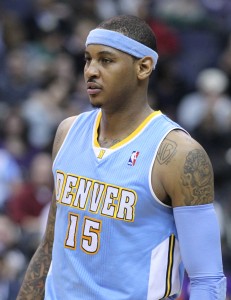
Carmelo Anthony’s departure from Denver in February 2011 could become a road map for future free agency-driven trades.
Route 2 would be to trade for a third star, either this summer or during next season. It’s possible that if Minnesota and Portland feel uncomfortable with their chances of keeping Love and Aldridge, they could trade them before the 2015 deadline. That would allow those teams to avoid potentially losing their franchise players for nothing, as the Lakers did with Howard last summer.
But for the Rockets to make the salary math work in a potential trade, both Asik and Lin would have to be involved. After failed attempts at trading each this season, I don’t see how Morey could be confident that an Asik/Lin-centered deal would ultimately be the preferred offer by one of those teams. In fact, one of the only plausible ways the Rockets could make a “star trade” next season would seem to be if Love or Aldridge used the Rockets’ cap room as leverage against other teams in negotiations, thus scaring away other suitors on the logic that the player is bound for Houston regardless (think back to Carmelo and the Nuggets/Knicks deal in 2011).
If Parsons is extended this summer, that option would essentially be off the table.
2015 carries minimal risk for all parties
On the surface, unrestricted free agency sounds scary. For Parsons, it means having to wait one more year to finally get his deserved payday. For the Rockets, it means exposing Parsons to the rest of the league as an unrestricted free agent and potentially having to pay a huge amount to retain him.
But when you actually go through the logistics, it makes at least some sense for all involved.
For Parsons, whatever value he loses by playing one more “cheap year” could be recouped (and perhaps even more so) by the higher market price he could command as an unrestricted free agent in July 2015. He’s also proven quite durable throughout his young career, so injury risk isn’t significant.
For the Rockets, the team in place now would mitigate any risk that Parsons would actually want to leave. Parsons is loved in Houston and is seen as the leader of a cohesive, young and contending team. If money is equal, why would he want to go elsewhere? Sure, Parsons and his agent would likely shop around the league for the best offer – before ultimately going back to Houston and giving them the opportunity to match (much like Goran Dragic’s free agency in July 2012).
But unlike when the Rockets decided to let Dragic go, they wouldn’t still be in the process of building a contender and needing to retain flexibility. Here, they already have one. So if Houston must overpay to keep Parsons, so be it. With Harden, Howard and a hypothetical third star in place, it’s not as if the Rockets would need to save that cap space. They’d already be capped out regardless.
If Les Alexander is willing to spend to keep a contender together – and by all accounts, he is – a potential “overpay” of Parsons in 2015 isn’t something the Rockets should be overly concerned with.
In fact, if the cards are played right, it could be the cherry on top of a potential Houston dynasty.
You may like
Houston Rockets
Looking Back on the Trade for Phoenix’s Draft Picks
Are the Rockets set to cash in on Phoenix’s downfall or could a Suns retool murky the waters?
Published
1 month agoon
March 12, 2025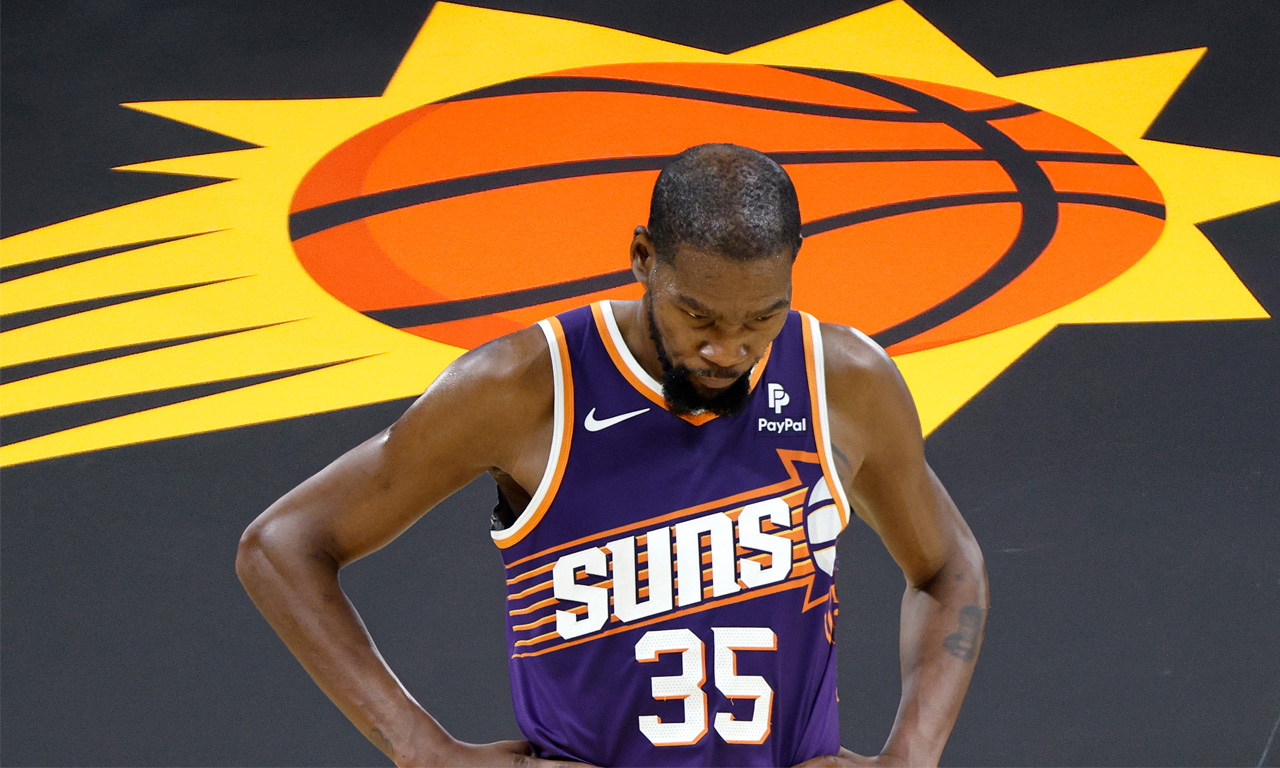
As the Houston Rockets set to host the Phoenix Suns tonight, it seems the right time to take a look back at the trade that linked these two franchises together for the foreseeable future.
This past June, the Rockets made a trade with Brooklyn that sent back to the Nets control of their 2025 and 2026 unprotected first-round picks. In exchange, the Rockets received a large chunk of Phoenix’s future (2025, 2027, 2029) and control of the Dallas Mavericks’ 2029 first.
In essence, the Rockets traded one pick and one swap for two picks and two swaps. All unprotected.
Thoughts At The Time of the Trade
If I’m going to discuss the current outlook of this trade, I have to be honest about how I saw it at the time of the move. While I didn’t hate this trade initially, I definitely didn’t love it either.
I liked that the Rockets increased their overall trade assets. I also liked that they extended the timeline to be able to make a bigger trade and I also appreciated that they kept control of the 2027 Brooklyn swap.
But I didn’t like that the Rockets gave up what seemed like the more established value (Brooklyn) for a more uncertain gamble (Phoenix). The Rockets did not control a “tanking runway” of picks to offer back to Phoenix — all of the picks Houston got in the deal were in staggered years (’25, ’27, ’29). I also felt Brooklyn, who badly needed to rebuild, got away with paying market value to get their picks back despite the fact that the Rockets invested years in watching those picks appreciate up to the point that they had the Nets completely over a barrel.
Net-net: I felt like more certainty was traded for less certainty and it was more of an equitable trade for both teams rather than Brooklyn paying dearly to get back the things only the Rockets could offer.
There were two ways I thought this trade could pay dividends: The Suns needed to flame out immediately, as in this season (unlikely), or the Rockets could trade all those pick assets as part of a deal for a real superstar in the next 12-18 months (more likely).
In a testament to how quickly change can occur in a very unpredictable NBA, four things have happened that have been positive indicators for the Rockets in making this move.
The Suns are fading
While Phoenix had major salary cap issues, dealing with the second apron, they didn’t appear to have problems on the court. They jumped out of the gate 8-1 and looked like a legitimate contender behind their star trio of scorers in Kevin Durant, Devin Booker and Bradley Beal.
Given Houston controlled Phoenix’s pick this year via a swap, it looked like the Rockets would come up empty-handed on the trade this season.
That changed quickly.
Injuries, serious depth concerns and a lack of a defensive identity has sent Phoenix spiraling. Booker’s availability has been inconsistent, forcing Durant to carry the load, while Beal has not quite fit in at all. Their financial limitations, thanks to owner Mat Ishbia’s all-in spending spree, have handcuffed their ability to improve the roster around the three stars.
The Suns are sitting 11th in the West, having gone 22-34 since that hot start, and are currently trying to catch a depleted Dallas squad to get back into the play-in picture.
As of right now, the Rockets project to end up with a lottery pick (albeit a late one) this season out of the trade.
Phoenix was caught shopping Durant
Because the Suns struggled so hard after the start, they tried to make a major move at the deadline but could not unload Beal, in large part due to his no-trade clause.
As a result, they may have made a misstep: They openly tried to trade Durant, which inevitably became public news.
Now? Durant will almost assuredly be traded this summer — likely to a destination that he handpicks. This means the Phoenix Suns will have to look at all possibilities for their future, including potentially having to give Rafael Stone and the Rockets front office a call.
But keep in mind, the Rockets can not offer Phoenix the ability to completely rebuild via the draft right now. Phoenix’s 2026 pick is controlled by Washington. They would have to get extremely creative to set that stage. A retool in Phoenix is much more likely.
Could Brooklyn have been better than expected?
This one is tougher to gauge.
The Brooklyn Nets are currently tied for fifth-worst team in the league, giving them strong lottery odds this summer. This was expected. After all, the Nets, even with a healthy Mikal Bridges and a full roster, were not a good team last season, closing the year 20-41 in the final three quarters of the season. The Rockets ended up with the #3 pick (Reed Sheppard) as a result of Brooklyn’s mediocrity.
However, if the Rockets had not placed that pick back in Brooklyn’s hands, would the Nets be better than this?
Brooklyn brought in a new coach in Jordi Fernandez that has had a positive impact. They have dumped off players, such as Dennis Schroeder and Dorian Finney-Smith, that impacted winning. The bar to make the play-in in the East (.415 winning percentage) is obscenely low, with Brooklyn being just five wins away from it at the moment.
And on top of that, Brooklyn did have lots of draft capital that they could have moved to try to win now.
It’s very tough to say as you don’t know if a team with Bridges still in Brooklyn might have actually been worse than this current squad, but you could make a case that the pick the Rockets would have ended up with from Brooklyn this season would be eerily similar to the one they will end up getting from Phoenix this year.
Again, this is a tough call.
Nico Harrison Hooked the Rockets Up
As part of the trade, the Rockets got control of the Dallas Mavericks’ 2029 first-round pick (unprotected, of course). While there’s really no way of knowing what a pick will be five years out, we did know that Luka Doncic would be just 29-30 years old that season and it was fairly etched in stone that he would be the core piece of a Dallas squad that season.
Enter chaos in Dallas.
Doncic was shipped out in the trade that shocked the world, which could have a major impact on the Rockets. Dallas’ current core of Kyrie Irving and Anthony Davis will be 37 and 36 years old that season, respectively.
On paper, the value of that pick shot up.
Final Summary
Right now, the outlook on these picks looks strong. One source stated off the record that they feel the 2029 Phoenix pick is the best pick asset out there that is owned by another team. The Rockets would be reluctant to add that one specifically into any trade unless it’s for a truly legitimate star.
But if there is any lesson that the NBA teaches us over and over again, it’s that it’s very hard to predict where a team will be a year from now, much less three years from now.
Can the Rockets pressure Phoenix and leverage the ownership they have of their draft capital to get what they really want (Booker) from them? Could a Suns retool around Booker and Beal, with the right pieces and assets acquired from a Durant trade, significantly change their on-court outlook and cap sheet — which in turn could damage the value of the picks Houston controls?
Bottom line is it has worked out well this season, and the future forecast at the moment is promising. The current value of those future picks appears strong. What will likely determine history’s final grade for this trade will be how it sets them up for the trade to come, and that’s where fans will be looking to Stone and the front office for action starting this summer.
Houston Rockets
Amen Thompson’s ankle injury will be re-evaluated in one week
“The things he does you can’t replicate,” says Rockets coach Ime Udoka
Published
2 months agoon
March 10, 2025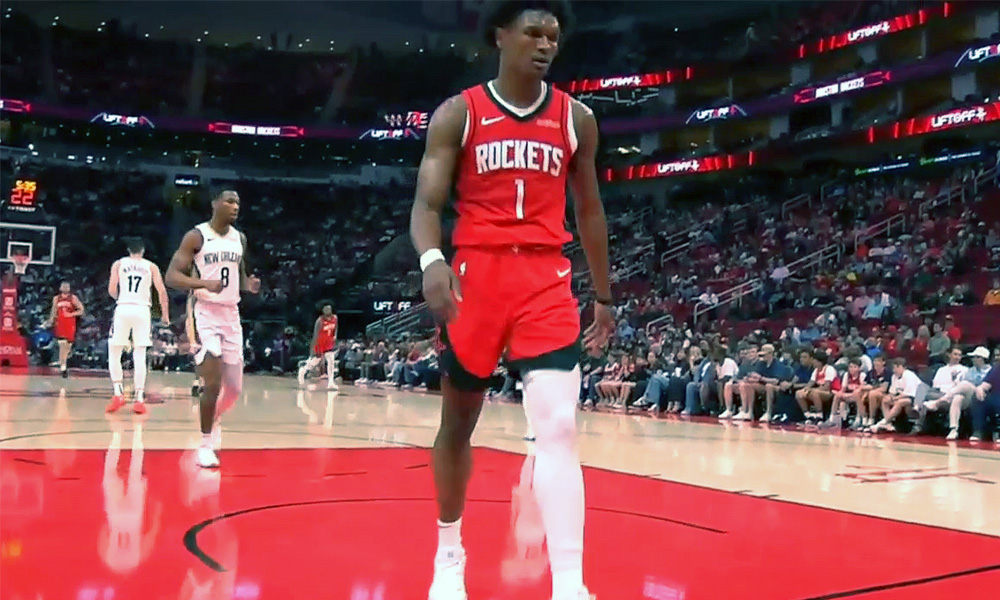
Rockets young star Amen Thompson will have his ankle injury re-evaluated in one week, according to Ime Udoka.
Thompson had an MRI on Sunday and the Rockets coach confirmed all imaging (X-ray, MRI) was negative.
“Just some swelling and pain, obviously,” said Udoka.
If you listen to Udoka, you can tell he knows how special Amen is to this team. He said the Rockets are missing a lot by not having him out there.
“Obviously, the things he does you can’t replicate,” said Udoka. “[Amen is] a guy that plays every position for us. When one goes down, he runs the point. If another is out, he runs the four.”
Amen is one of the best defensive players in the game, and as a one-on-one defender of guards/wings, he might already be the best in the league in just his second season. He’s holding his opponents to 40.5% shooting from the field, tops in the league.
“He’s a very unique defensive player,” said Udoka. “We got some guys that do some great things there, but I like to put him and Dillon on the best two usually, night to night. You got Tari and that’s a luxury as well, but the way he goes about it is different. His athleticism, size, speed, strength, shotblocking ability, steals… he’s all over the place.”
“Hard to replicate for sure.”
Amen injured his ankle late Saturday night in a blowout win against the Pelicans, but the unfortunate part was he probably should not have been on the floor in the first place.
The Rockets left Amen Thompson in the game in a blowout to get one more rebound for a triple-double and he just got injured. He's heading to the locker room with a limp. https://t.co/UBtrEpgWuU pic.twitter.com/D8GeKP8sQk
— ClutchFans (@clutchfans) March 9, 2025
The Rockets had built well over a 30-point lead by early fourth quarter. Jalen Green was able to rest the entire fourth. Alperen Sengun came out of the game with 7-8 minutes left while Dillon Brooks and Tari Eason came out with 6:00 left. But Thompson, who had posted an insane +39 on-off number, remained in the game because he was one rebound shy of a triple-double with 15 points, 11 assists and nine rebounds.
Udoka addressed that decision on Monday before the game against Orlando.
“What I typically don’t do is wholesale substitutions,” said Udoka of the decision to keep Amen in the game. “Albeit 30[-point lead] at six minutes [left] is different than losing to Minnesota, a 16-point lead with four minutes [left].”
“I’ve seen it go both ways in the past. You take out guys too early and have to bring starters back, and vice versa.”
Thompson has played in 60 games this season, five short of being eligible for postseason awards. He absolutely should be up for an All-Defensive nod this season so keep an eye on him getting back in time for that. He would need to return to action no later than April 4th for the game against the OKC Thunder in order to play enough games to be eligible.
Houston Rockets
How the Kyrie Irving Injury Impacts Rockets
Houston’s draft positioning and offseason plans could be impacted by Dallas
Published
2 months agoon
March 4, 2025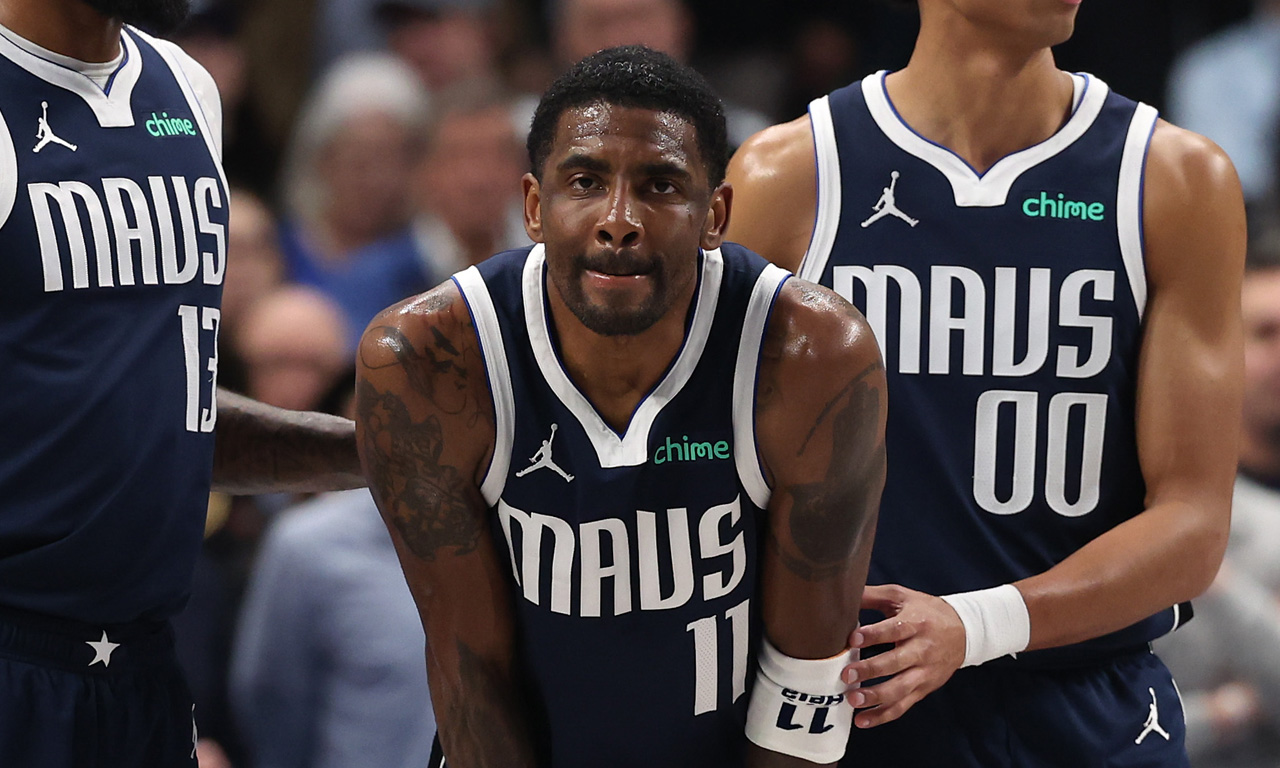
Dallas Mavericks guard Kyrie Irving was injured Monday night and the news dropped on Tuesday that the knee injury is serious — a torn ACL in his left knee that will end his season and a good portion of next season as well.
Brutal. I can’t think of an NBA team that imploded faster than the Dallas Mavericks.
You trade away a 25-year-old phenom who just hoisted you on his back en route to the NBA Finals a year ago. You cashed in that golden ticket to go all-in on a trio of aging stars in Kyrie, Anthony Davis, and Klay Thompson.
Bold strategy, Nico. Let’s see if it pays off.
(Narrator: It’s not paying off.)
The Mavericks had some interesting potential this year and maybe the next couple of years once everyone was healthy, but now? Their star guard is likely out until the calendar year 2026 and Klay and AD aren’t getting any younger nor more durable. The Mavericks may have actually swapped their future for a present that never arrives — and Dallas GM Nico Harrison has to be feeling overwhelming pressure right now.
So how does this impact the Rockets?
For starters, Houston has a game remaining on the schedule against Dallas on March 14th at Toyota Center — Davis may or may not be back for that game.
More importantly, Dallas is the 10th seed in the West at the moment, just 3.5 games ahead of the Phoenix Suns (11th seed). The Rockets control Phoenix’s first-round pick unprotected this season via a swap. We need as many West teams as possible ahead of Phoenix to keep them out of the play-in/playoffs and to push them as deep into the lotto as possible.
This complicates that. Phoenix’s remaining schedule is the toughest in the NBA by a good margin, with plenty of games left against the league’s best teams, so it still looks promising overall — but we’re talking about Kevin Durant, Devin Booker and Bradley Beal. They can still get hot at the right time while Dallas may struggle.
So keep a close eye on that. The good news is the Portland Trail Blazers are one of the hottest teams in the league and they are (shockingly) nipping at the Arizona squad’s heels.
Taking a look ahead to the offseason, the Kevin Durant Pursuit will be big.
This one is a little more complicated for Houston. The Rockets really want Devin Booker but, as of now, the Phoenix plan appears to be to trade KD this offseason and retool around Booker. The Rockets will have interest in Durant but they’re not going to sell the farm (prospects and all the picks) for a 37-year old like they would for Booker.
Three teams that I’ve heard a lot about from Rockets circles that will be in the mix are Houston, Minnesota and Dallas — Timberwolves and Mavericks have been considered the main competition. But, a lot of this will depend on Durant himself and where he wants to play at this stage of his career.
Keep in mind also, if the Suns are “retooling” around Booker and Beal (holding the no-trade clause), then they could be placing a higher priority on win-now players over the return of their own draft assets. The Rockets definitely have the best assets overall to offer up in any trade package between those three teams, but if Phoenix does prefer finding the right ready-to-win players around Booker/Beal, that gives Dallas and Minnesota a real chance.
This injury “may” take Dallas out of the equation, and they are/were definitely a contender for KD’s services given his past relationship with Kyrie and the way Dallas was positioned to win right now. Does KD at his age want to wait for Kyrie to be healthy?
And one last friendly reminder: The Rockets control that Dallas 2029 first (unprotected).
Houston Rockets
Rockets Sign David Roddy to Two-Way Contract
Former first-round pick has played with the Grizzlies, Suns and Hawks
Published
2 months agoon
March 3, 2025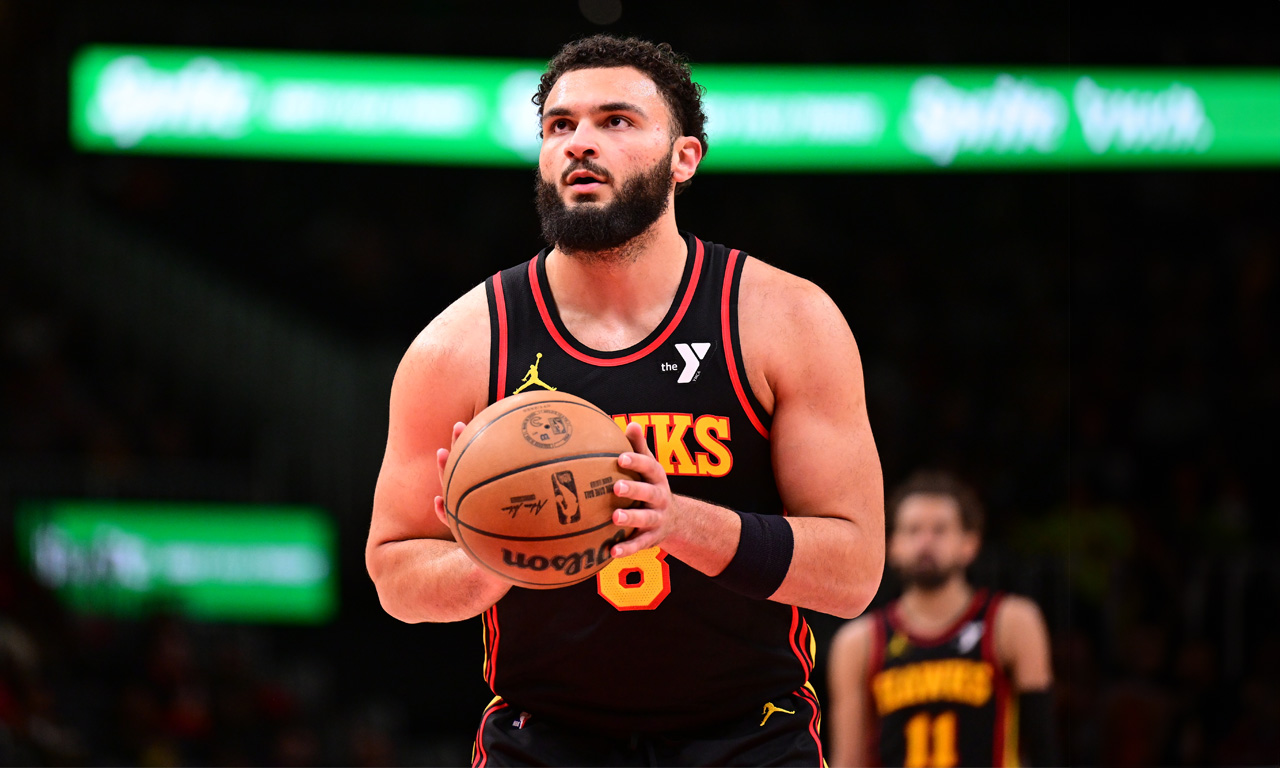
The Rockets made a move on Monday, signing former first-round pick David Roddy to a two-way contract.
The two-way spot opened up after the front office signed Jeenathan Williams to a standard four-year, $8.2 million contract (with friendly team options all along the way).
Roddy is 6-foot-5 and 250+ pounds but sports a 6-foot-11 wingspan. He was taken with the 23rd pick in the first round of the 2022 NBA Draft — six selections after the Rockets drafted Tari Eason. A standout in college, Roddy averaged 19.2 points, 7.5 rebounds, 2.9 assists, 1.2 steals, and 1.1 blocks per game during his junior season at Colorado State.
Roddy, who turns 24 later this month, is a physical player who can play multiple positions. He’s a solid rebounder for his size/position. He has played in 165 games over three seasons with the Grizzlies, Suns, Hawks and most recently Sixers, averaging 6.2 points and 2.9 rebounds per game.
The guard/forward has not shown efficient shooting, however — he’s a career 30.5% three-point shooter and just 68.4% from the line. His defense is better inside than out.
Ultimately, it will be those two things — three-point shooting and defense — that will determine his chances of carving out a consistent role in the league.
All in all, it’s a low-risk signing and the Rockets get a look at a prospect that fits their age timeline.
Houston Rockets
Houston a potential landing spot for Ben Simmons post-buyout?
Published
3 months agoon
February 6, 2025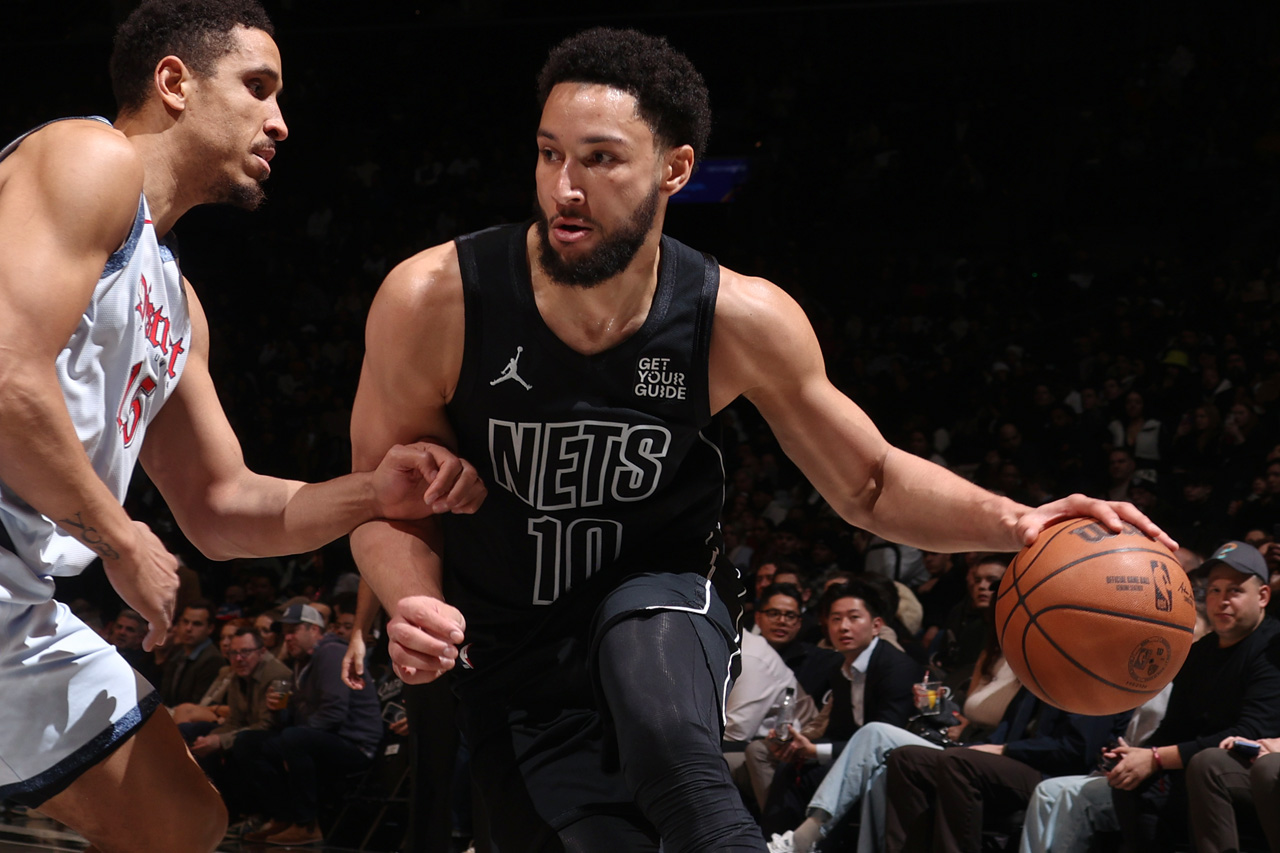
ESPN NBA analyst Brian Windhorst said on Thursday’s NBA Trade Deadline show that Brooklyn Nets forward Ben Simmons is working on a buyout and the Houston Rockets is a potential landing spot for him.
“Cleveland and Houston are two situations for Ben Simmons,” said Windhorst.
Brian Windhorst says the Cavaliers and Rockets are buyout locations for Ben Simmons.
Thoughts? pic.twitter.com/7ly4mvmxr5
— ClutchFans (@clutchfans) February 6, 2025
Advertisement
Rockets coach Ime Udoka was an assistant coach in Philadelphia in 2019-20 when Simmons was with the Sixers, before injuries took a significant toll. In fact, Udoka, when speaking about Amen Thompson earlier this season, brought up some comparisons to Simmons.
“The skill set is there, and it’s something that’s unique with his speed, athleticism, size, passing ability, and all those things,” said Udoka of Thompson. “I coached somebody, Ben Simmons, who had similar traits… as far as size and ability to push the pace, and find guys and finish. There are some similarities there.”
Both Thompson and Simmons are known for their elite athleticism, defensive versatility, and ability to create opportunities in transition.
However, can Simmons help the Rockets today? That’s the tough question.
Simmons has played in 33 games this season, averaging 6.2 points, 6.9 assists, 5.2 rebounds, 0.8 steals and 0.5 blocks in 25 minutes a night. He does not shoot threes (like, at all) — he has only attempted two threes in the past three seasons combined.
Ideally, he does not play in front of your young forwards of Amen, Tari Eason and Jabari Smith Jr. and on that basis alone, I think I would pass. But, Ime loves defensive dogs and he could use some extra ballhandling on the roster. You can see that there’s little in the way of offensive organization when Fred VanVleet is out.
There would be a comical full circle moment though if the Rockets did sign Ben Simmons, considering the Rockets were heavily criticized for trading James Harden in 2021 to Brooklyn instead of to Philadelphia for Simmons. The Rockets clearly made the right choice there.

